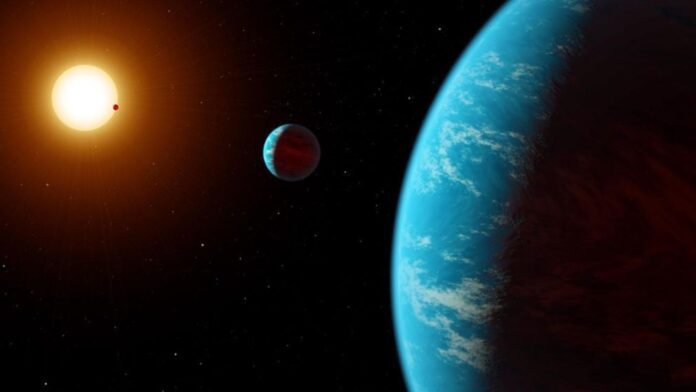A new study reveals that the atmospheres of some planets beyond our solar system are slowly leaking away into space, causing these worlds to shrink in size over time.
Air Escaping Through Planetary Processes, Not Stellar Winds
The air loss is not caused by winds from the planet’s stars stripping away their protective atmospheres, as scientists had expected. Rather, around 90 tons of atmospheric gases from these exoplanets, some larger than Earth but smaller than Neptune, are escaping daily due to an internal process known as “core-powered mass loss.”
Earth’s atmosphere would take 15 trillion years to fully deplete
By comparison, Earth’s atmosphere only loses about 90 tons per day from heating from the sun’s radiation. At this rate, our planet’s atmosphere would take at least 15 trillion years to completely disappear, so there’s no cause for alarm.
Exoplanet Atmospheres Pushed Away from Within
But for some puffy exoplanets in the sub-Neptune size range, radiation emanating from their hot cores is actively pushing away their atmospheres from the inside out. This mechanism can shrink a sub-Neptune down to a rocky super-Earth over time. Additionally, you can also read about- The Mysterious Young Age of Mars Rocks on Earth Explained
Leakage Explains the Gap in Exoplanet Sizes
Astronomers now have enough data to explain the apparent lack of exoplanets between 1.5 and 2 times Earth’s size. The ongoing atmospheric loss makes it difficult for sub-Neptunes to remain in that size range.
Star Cluster Data Reveals Effects Over Time
The research team analyzed data on sub-Neptunes orbiting stars in two star clusters: the 600 million-year-old Praesepe cluster and the 800 million-year-old Hyades cluster. Nearly all stars hosted orbiting sub-Neptunes, indicating their atmospheres had not yet depleted. But in stars more than 800 million years old, only 25% had sub-Neptunes remaining. This suggests the longer timeframe allowed core-powered atmosphere loss to occur on many planets.
Not Enough Mass to Hold Onto Atmosphere
The findings indicate that exoplanets need sufficient mass to retain their atmospheres over billions of years. Otherwise, the atmosphere will eventually leak away, causing the planet to shrink in size.
You May Find Interest: Vast Reservoirs of Water Uncovered Deep in the Earth’s Mantle




![Ranking US States: From Healthiest to Least Healthy [2024 Guide] Health Rankings US States](https://articleify.com/wp-content/uploads/2024/03/Health-Rankings-US-States-218x150.jpg)









![Technical Aspects of 844 Area Code in 2024 [Detail Guide] 844 Area Code](https://articleify.com/wp-content/uploads/2024/01/844-Area-Code-150x150.jpg)














